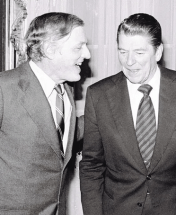
As the price of gold has surged over $4,000 an ounce, economists whip their trusted calculators out and moan about Gordon Brown.
Between 1999 and 2002, when he was Chancellor, Brown sold 395 tonnes of gold, about half our reserves, at an average price of $275 an ounce. That was low even then, as Brown knew perfectly well.
In today’s money, $275 is about $550, a meagre two-fold increase, whereas the price of gold… Stop it, don’t make me weep. Had Brown held on to that gold, the Exchequer would today be £35 billion better off – just think how many more illegal immigrants we’d be able to put up at four-star hotels.
Let’s make one thing clear. Gordon, for all his abominable socialist traits, is no moron. In fact, compared to his current counterpart, Rachel Reeves, he is a genius of Smithian proportions. So why did he do something even rank amateurs knew was foolhardy?
The answer is, dumping that gold only seems stupid to you and me. To Brown, it made perfect sense: he was acting on an inner imperative of all modern governments.
This is encapsulated in the title above, but I’ll rephrase that statement to make it airtight: because governments love inflation, they hate gold. For you to agree, you have to accept the hypothesis I invariably use as the starting point of probing into governments’ motives.
A hypothesis is vindicated when it explains all the available facts, as this one does. So here it is: the only thing modern states are after is a steady increase in their own power at the expense of the power of the individual.
It doesn’t matter whether the state in question is totalitarian, authoritarian or, as in this case, democratic. They all share the same overarching goal even if they may pursue it in different ways.
Not all state officials arrive at this realisation by a rational process. But all of them understand it viscerally – and act accordingly.
That’s why, even though all governments make noises about reducing inflation, none has ever succeeded in doing so long term. Market fluctuations may sometimes push inflation down, but state action never does.
The motivation is clear: inflation is a tax that requires no legislative approval. By inflating the currency, the government effectively transfers money from the people’s accounts into its own, with a parallel transfer of even more power the same way.
It was only in the 20th century that governments realised that inflation could be a useful power tool. Once that realisation, or rather post-rationalisation, sank in, they cranked up printing presses to high gear and buried sound money under an avalanche of virtual, effectively counterfeit, currency.
Wishing to bind its citizens hand and foot, the state itself had to slip the tethers of fiscal responsibility. Thus promiscuous public spending achieves a dual purpose: it makes more people dependent on the state while also ushering in high inflation. The upshot is the same: greater state power. Job done.
This explains the innate hostility to gold all modern states feel in their bone marrow. An economy based on gold deprives modern governments of their flexibility to meddle in the economy.
The difference between people keeping their assets in gold or in currency is critical to my hypothesis. Gold coins or ingots sitting in a bank vault are a factor of their owner’s independence: the money is beyond the state’s reach, more or less. Not so banknotes: we are welcome to stuff suitcases full of paper, but the government, its hand on the printing press button, has an almost absolute control over its value.
Hence the attraction of the gold standard to those who value their freedom above an ability to ride the economic rollercoaster through hair-raising rises and dips. It puts people, as opposed to the state’s whim, in control of their own pecuniary destiny.
The gold standard may make an economy less upwardly mobile, but in return it will make it more stable and free. For that reason, it’s anathema to any modern government – and the more socialist a government, the more it hates gold.
That’s why all such governments, whether totalitarian socialist or socialist democratic, declare war on gold the moment they take over. Thus immediately after the Revolution, the Bolsheviks confiscated all gold owned publicly or privately. Anyone caught hoarding gold was summarily shot (if he was lucky).
However, when FDR took over, he did exactly the same thing, and replacing execution with fines was his only sop to democracy.
In 1933 Roosevelt issued Executive Order 6102, “forbidding the hoarding of gold coin, gold bullion, and gold certificates” by US citizens and demanding that they sell all their gold to the government at the price set by the buyer. Failure to comply was punishable by a fine of up to $10,000 or imprisonment of up to 10 years, or both.
The amount of the fine is staggering, especially in relation to the one dollar a day then paid to the millions employed in public works. As to the threat of a tenner in prison for failure to hand in all privately owned gold within a month, Roosevelt, as we have seen, was treading a well-beaten path: the Bolsheviks had shown the way.
Having forced Americans to sell their gold to the treasury for $20.66 an ounce, the next year FDR used the Federal Reserve machine to ratchet up the price to $35, a level at which it stayed fixed for the next 38 years. However, at that point it was allowed to float, which is to say to rise in parallel with the practical pulping of paper money.
Now the price of gold has floated upstream to $4,000 an ounce, which means the economy is heading for the rocks. A sharp increase in gold price is almost always a sign of impending economic catastrophe.
The markets lose faith in the states’ ability to manage their spending and service their mounting public debt. Hence they rush out of government bonds and currencies, seeking instead the relatively safe haven of gold.
Since the law of supply-demand hasn’t yet been repealed, the price of gold shoots up. But explaining this in purely economic terms will never work. It takes not economists but philosophers and, yes, theologians to explain why the combined British inflation in the second half of the 19th century was 10 per cent, while in the second half of the 20th century it was 2,000 per cent.
Both the public and especially the state had to change their economic behaviour drastically to effect such a cosmic shift. And the current price of gold is among the most reliable indicators of a shift gone wrong.
Its present jump to $4,000 an ounce screams calamity loudly enough for even our deaf (and dumb) government to hear. Yet its love of inflation and hatred of gold are the spots this particular leopard can never change.
To make the economy sound and gold cheaper the modern state would have to stop being modern. This is a logical and, if you will, ontological impossibility. So brace yourself for a rough ride. It’s definitely coming.








